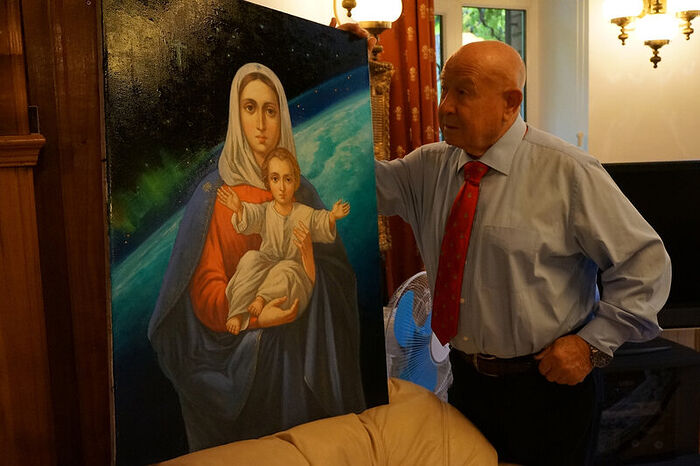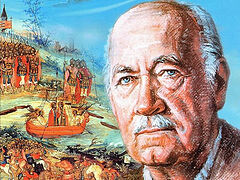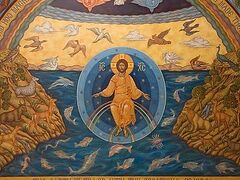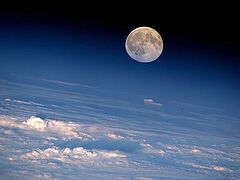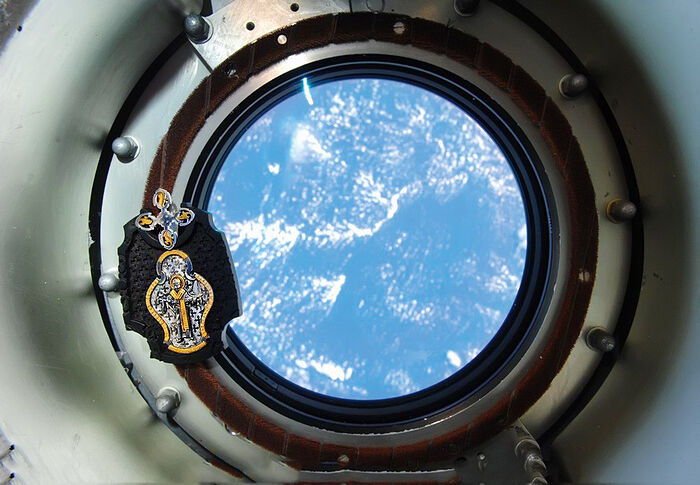 An icon of St. Nicholas the Wonderworker in outer space (the flight of the cosmonaut Sergei Volkov, 06.07.2011–11.22.2011 on the Soyuz TMA-02M spacecraft)
An icon of St. Nicholas the Wonderworker in outer space (the flight of the cosmonaut Sergei Volkov, 06.07.2011–11.22.2011 on the Soyuz TMA-02M spacecraft)
The earth is the Lord’s, and the fulness thereof; the world, and they that dwell therein (Ps. 23:1), the Holy Scriptures say. The Holy Fathers unanimously assert that the word “earth” means the entire cosmos created by God. The Lord set us a goal—to fill our planet and examine the Universe. Therefore, the desire of man to rise to the stars is not a whim. God instilled in human nature the desire for knowledge—the desire to learn new things and make useful discoveries. And space can give us this knowledge—that of the Earth and the Universe. The point is for what purpose, with what intention a person strives to go into outer space. If he is guided by pride and passions, of course, nothing good will come of it. Without the development and strengthening of faith scientific achievements are in themselves detrimental—they often lead to destruction, the cultivation of pride and harm to the scientist and humanity. But if science develops in parallel with faith, if a researcher explores outer space with a blessing, with God’s help and prayer, this is an important thing pleasing to God. After all, the exploration of the stunning and incomprehensible Universe cannot but testify to the existence of the Creator Who wisely arranged this world.
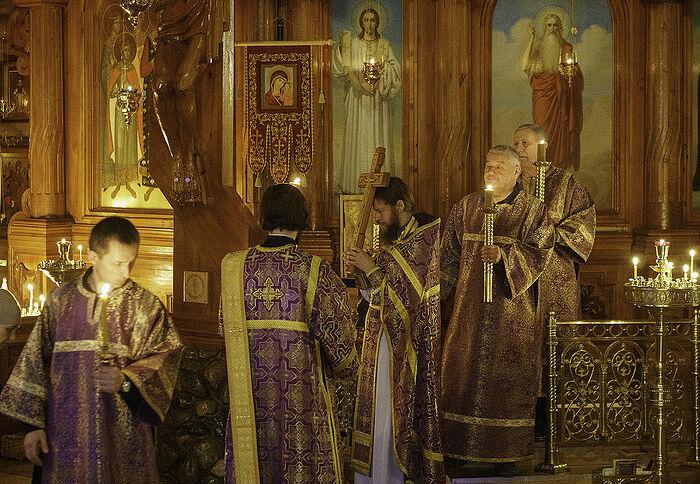 Cosmonauts serving as readers. Church of the Transfiguration of the Lord in Svyozdny Gorodok near Moscow, 03.26.2022, Sunday of the Veneration of the Cross
Cosmonauts serving as readers. Church of the Transfiguration of the Lord in Svyozdny Gorodok near Moscow, 03.26.2022, Sunday of the Veneration of the Cross
What is more important for an astronaut—faith or science? Does the acquired knowledge and experience alienate him from God, or vice versa? Answering this question, first of all it should be remembered that for any person God must come first in life, regardless of whether he is an astronaut, a doctor or a janitor. The goal of our lives is salvation, the acquisition of the grace of the Holy Spirit and communion with God, and being an astronaut is just a profession. According to St. Theophan the Recluse, “the living, inner, direct communion of God with man and man with God is man’s ultimate goal.”1 Every human being is called to attain this communion with God, purify his heart, and learn to love God and his neighbor as himself. However, compared to other people, astronauts still find themselves in more difficult conditions; their work is associated with a high risk to their lives, and an enormous responsibility lies on their shoulders. But the main difference between astronauts and people of other professions is that they (astronauts) are always at the peak of scientific and technological progress, and all the difficulties, problems, the fight between science and religion, faith and reason (that is, the invisible warfare in the hearts) becomes more acute here. As a result of the selfless work of astronauts we can observe a certain scientific picture of the world; and if we combine it with the one that is given to man through love and communion with God, then a correct view of the world, man, and outer space is formed.
Astronauts themselves testify that their interest in science does not contradict their faith, and the exploration of such a wisely arranged universe can only strengthen this faith.
“Without faith our work is difficult and almost impossible,” says Alexei Arkhipovich Leonov.2 “An astronaut going into orbit must know that everything will be fine. It is now possible to receive a priest’s blessing and go to church, as many do. But that wasn’t the case before… Back in 1965, when I got off the spaceship, I suddenly thought, ‘Man is just a grain, but the mind of these grains allowed me to be among the stars.’ It was truly a divine picture. The stars were everywhere, above and below me. And the Earth floated under me.”
“The Lord gave us the opportunity to explore the world,” says pilot and cosmonaut Valery Korzun. “Not only did God tell man: Be fruitful, and multiply (Gen. 1:28), but He also gave them the opportunity to be engaged in such fundamental sciences as physics, astronomy, etc… Religion and science do not contradict each other. We’ve had many scientists who secretly took monastic vows and made important scientific discoveries. These discoveries confirm many Biblical facts such as the Flood: the inclination of the Earth’s axis, the thickness and composition of the atmosphere, and many other things testify to us that nothing in this world is accidental. Thus, before each flight we invoke the name of God, ask for blessings and attend prayer services in the St. Sergius Lavra... I can’t say that all cosmonauts are Orthodox Christians, but almost all of them are believers, and over the many years of my practice I have met only two colleagues who refused a blessing and a prayer service in the Lavra before their flights.”
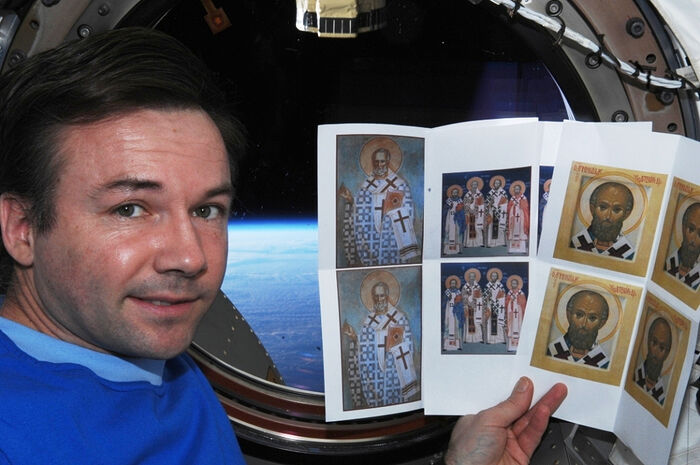 Commander of a space mission team Yury Lonchakov took icons of St. Nicholas with him on board the ISS
Commander of a space mission team Yury Lonchakov took icons of St. Nicholas with him on board the ISS
The pilot-cosmonaut Yury Lonchakov testifies:
“Faith in the Lord, our true Orthodox faith gives tremendous strength and inspiration for this difficult, dangerous work... I read the entire Bible for the first time in orbit. While reading, many questions would arise; I would write them down and, when there was time, I would call a priest on the Earth. Our work is very complicated, but when you return to your cabin in the evening, open and read the Scriptures, it gives great strength and inspiration for further work.”
There were cases when a person flew into orbit as an unbeliever, but converted during the flight. Thus, for example, the cosmonaut Vasily Vasilievich Tsibliyev, a spacecraft crew commander, asked his flight engineer Alexander Ivanovich Lazutkin before a flight: “Are you baptized?” Having received a negative answer, he was very upset because he understood one important thing: It is easier for a baptized person to carry out a responsible task. As the result of an open, sincere conversation, Alexander Ivanovich was baptized right at Baikonur. Other cosmonauts have also related that when they saw all the beauty of the universe, they concluded that it could not have appeared by itself from chaos, that the hand of the All-Wise Creator is seen here. This in particular was related by Gennady Mikhailovich Manakov. During a spacewalk he realized that such a special planet as the Earth could never have been formed through evolution. The cosmonaut Yury Ivanovich Onufrienko recalled that on his return to the Earth from a flight the parachute did not open. It was then that he learned to pray, and the Lord answered his prayers...
Cosmonauts have for a long time had a tradition of visiting the Holy Trinity-St. Sergius Lavra and praying at St. Sergius’ relics before leaving for Baikonur. The cosmonaut Gennady Padalka comments on this:
“We come (to the Lavra) to gain spiritual strength for the work ahead of us. This is not only a tradition, but also a calling of the heart. No one forces anyone—all the colleagues come with great pleasure because such trips give strength of spirit and fortitude.”
It can be said that this good tradition was begun by Yury Gagarin himself, who visited the Lavra with his friend Valentin Petrov, a teacher at the Cosmonaut Training Center. This is what Valentin Vasilievich later said about that:
“On that visit I was struck by one episode. The father-superior invited us to his cell, and Gagarin paused and said: ‘Valentin, were you in the cell?’ I replied, ‘No.’ He said, ‘I wasn’t either.’ And with his charming smile he addressed the father-superior, ‘Father, let’s first go to St. Sergius’ relics, and then anywhere!’ After we had venerated the relics, Yury Alexeevich asked me, ‘Did you smell something?’ I replied, ‘Yes, some unusual smell. Such grace, Yura!’ He answered, ‘There you go! I thought I alone smelled it.’”
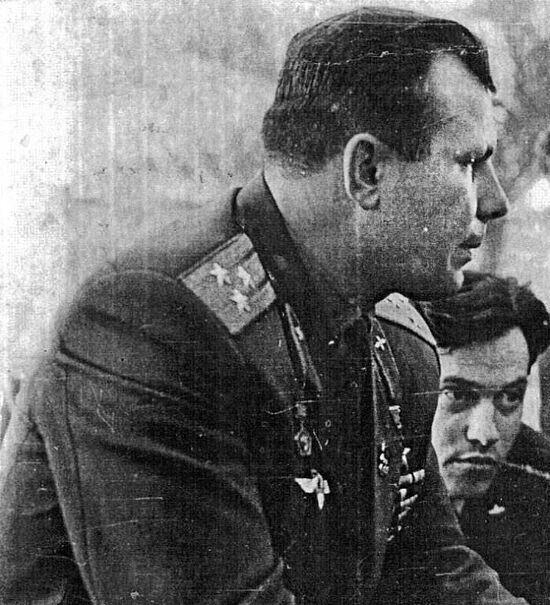 Yury Gagarin and Valentin Petrov at the twentieth congress of the Leninist Communist Youth League (Komsomol) of Ukraine. Kiev, 1966
Yury Gagarin and Valentin Petrov at the twentieth congress of the Leninist Communist Youth League (Komsomol) of Ukraine. Kiev, 1966
After a visit to the monastery, Yury Gagarin, in his speech in December 1965 at a plenum of the Central Committee of the All-Union Leninist Communist Youth League, dedicated to the patriotic education of youth, spoke about the need to restore the Christ the Savior Cathedral, since it was a national treasure that fostered patriotism in young people. The cathedral had been built in honor of the victory over Napoleon in the Patriotic War of 1812 by the efforts of the entire Russian nation and it should be restored as a symbol of victory. During Gagarin’s speech everyone in the hall believed that this was the view of the country’s authorities, and not just the cosmonaut’s personal opinion. After the speech they called Brezhnev and reported on what had happened, pointing out that such a statement could be regarded as Gagarin’s step away from Communism towards Orthodoxy. During a break the First Secretary of the Komsomol’s Central Committee Sergei Pavlov told Yury Alexeevich that Brezhnev had saved him. Leonid Ilyich then answered, “Do not touch Gagarin—this is his opinion. Say that there is no money to restore the cathedral, but we will restore the Triumphal Arch in the near future.”
In 1988, the commander of the Mir space station Vladimir Georgievich Titov openly and right from orbit greeted earthlings on the millennium of the Baptism of Russia. Before that momentous flight he had had two unsuccessful launches—the first spaceship had failed to dock with the space station, and during the second attempt a fire broke out at the launch complex, and only the emergency rescue system had prevented a tragedy. Vladimir Titov then shared his experiences with Valentin Petrov: “If someone would bless me, I would not be so worried.” Petrov answered: “Volodya [a diminutive form of the name Vladimir.—Trans.], no problem! Let’s go to Vladyka Philaret (Vakhromeev). I’ll contact him now! At that time Vladyka was the Chairman of the Department for External Church Relations of the Moscow Patriarchate and was well acquainted with Valentin Vasilievich. Vladimir Titov then saw the bishop for the first time, and the hierarch behaved as if he had known the cosmonaut all his life. Having presented Vladimir Georgievich with a copy of the Kazan Icon of the Mother of God and an icon of the holy Prince Vladimir, Vladyka said: “Don’t worry! I will give you a church calendar which you will read there.” It was from him that Titov learned about the celebration of the Millennium of the Baptism of Russia.
Cosmonauts prepare for each flight with reverence and awe. They take the Gospel, icons and various relics with them. Some of these relics have flown around the Earth and been in outer space. Thus, particles of the Life-Giving Cross of the Lord were in outer space with Maxim Suraev for half a year. A crew commander Yury Lonchakov flew with a particle of St. Sergius of Radonezh’s relics (twice in outer space, blessing the Earth with it). Fyodor Yurchikhin took into outer space particles of the relics of the Great-Martyrs Theodore the Recruit, Theodore Stratilates and George the Victorious. Icons of St. Elias of Murom and the holy Great-Martyr Barbara were in outer space with the blessing of His Holiness Patriarch Alexei II during the flight on the “Cobalt” unmanned spacecraft from August 18 to December 19, 1999. This was the first ever joint project of the Russian Orthodox Church and the command of the Strategic Rocket Forces. Particles of the relics of Sts. Peter and Philip, Metropolitans of Moscow, were in a space flight with the crew of a spacecraft under the command of Anton Shkaplerov. The cosmonaut Sergei Ryzhikov took to the International Space Station a particle of St. Seraphim of Sarov’s relics, which, with the blessing of His Holiness Patriarch Kirill, he received from Metropolitan George (Danilov) of Nizhny Novgorod and Arzamas. A reliquary with some myrrh from St. Nicholas the Wonderworker’s relics and a particle of the wooden shrine in which the saint’s relics had been transported from Myra in Lycia to Bari in 1087 were in orbit for six months with the crew of Fyodor Yurchikhin and twice visited outer space.
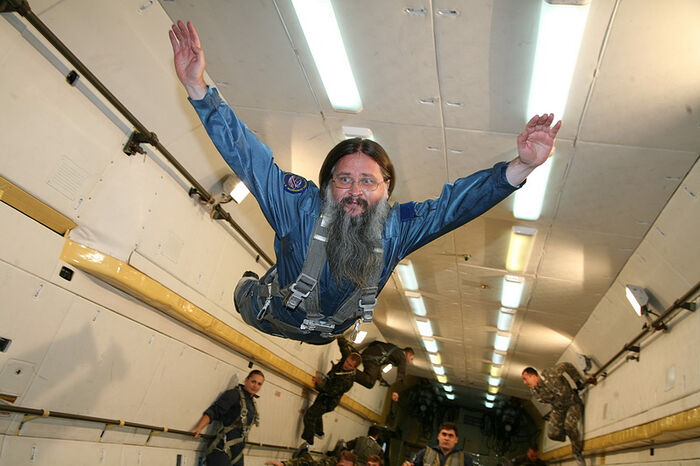 Igumen Job (Talats) in zero gravity
Igumen Job (Talats) in zero gravity
In 2008, in Zvyozdny Gorodok (“Star City”) near Moscow, where Russian cosmonauts live and prepare for flights, the construction of the Church of the Transfiguration of the Lord started. The first Divine Liturgy in it was celebrated by Igumen Job (Talats) on Forgiveness Sunday, February 14, 2010. Special attention is given to pastoring cosmonauts and their families because their work involves a huge load, incredible risks and long stays in orbit, without any opportunity to attend church and participate in the sacraments. To support the cosmonauts in orbit special communication sessions are carried out over a dedicated channel when they can talk with a priest and even with parishioners. On the major Church feasts videoconferences are organized between cosmonauts and the Primate of the Russian Orthodox Church. The choir of the Holy Trinity-St. Sergius Lavra comes to the Mission Control Center of Roscosmos and small concerts are held for those at the orbital station. Relatives of cosmonauts in anticipation of the return of their loved ones can always come to the church, pray and receive consolation. Such support is very important, because everyone above all needs (wherever he may be, on the Earth or in space) to learn to be with God.
Flights into outer space are necessary so that, trying to comprehend the mystery of the universe, we can understand that the Universe could not have appeared by itself, without the hand of the Creator; so that we can get to know ourselves—who we are, why we were created and how we should treat this world and its Creator.

